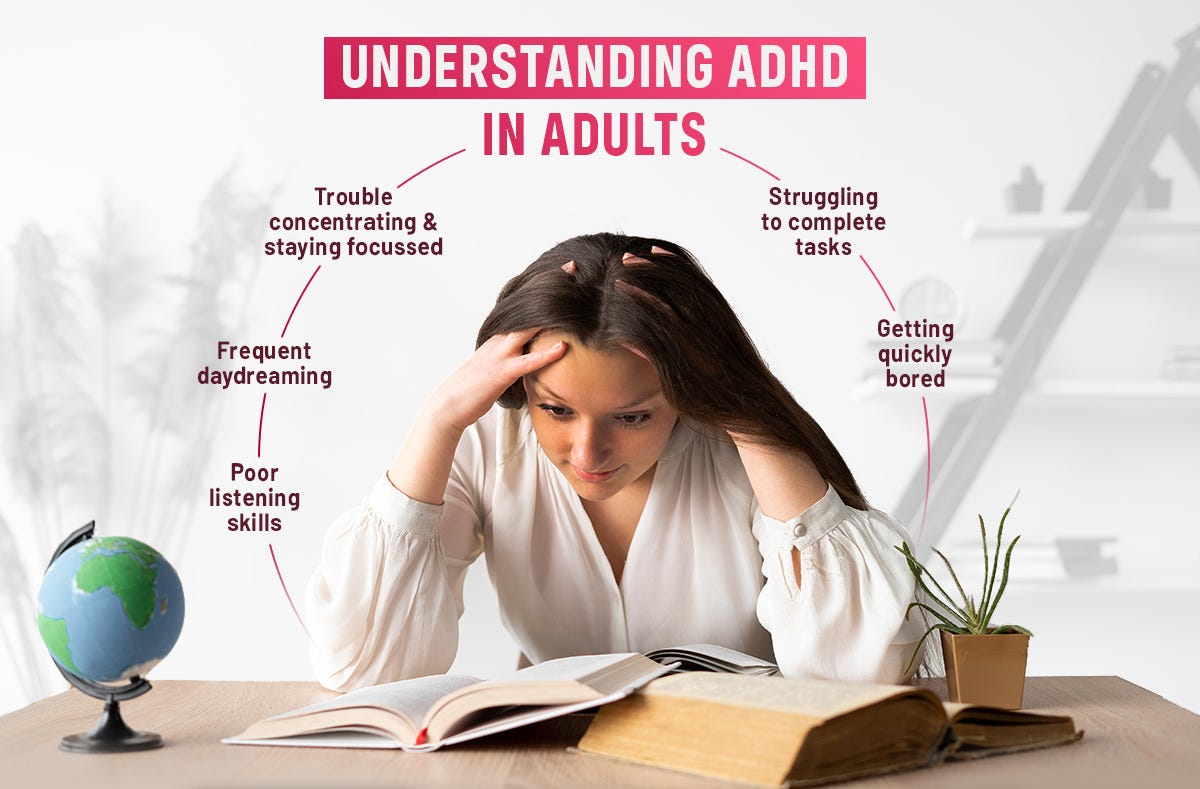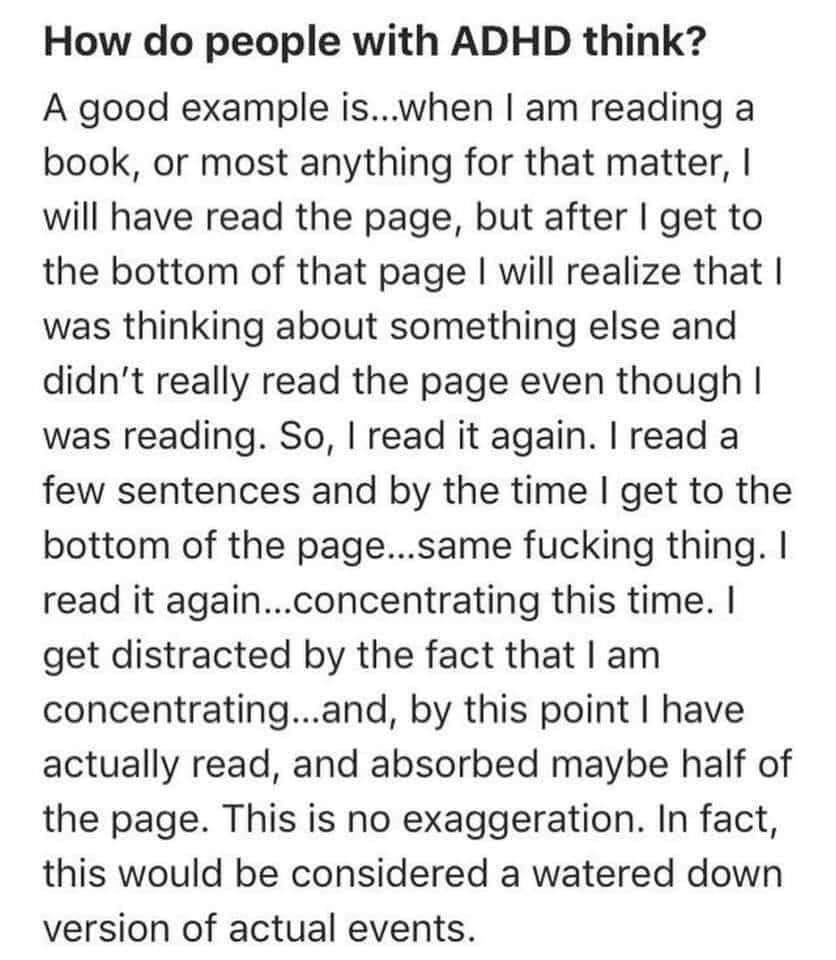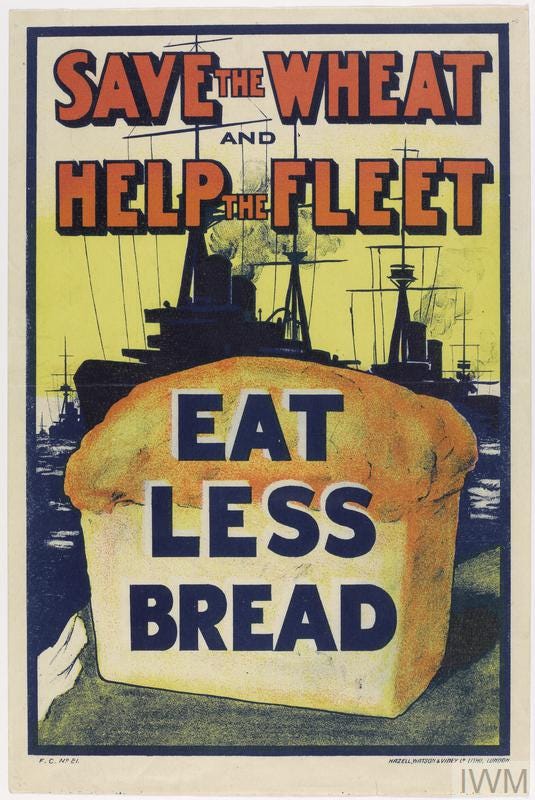Jack shows so much promise...but he lacks focus and has no attention span
That should be the title of my autobiography
Ah, yes. Self-doubt, boredom, and lack of focus. Welcome to my world, y’all. Not that you’d probably want to spend much time here.
There was a moment, perhaps two decades ago, when I was engaged in an argument with my ex-wife. Well, OK, it was more of a strong disagreement, I suppose, but after about five minutes, I distinctly recall having intense difficulty maintaining the thread of the discussion.
It wasn’t so much that I didn’t understand the subject of our disagreement, but more that somewhere along the line, I’d lost the trail from point A to points B, C, etc., to wherever we were at that moment. And it wasn’t that I wasn’t paying attention because whenever SueAnne and I disagreed on something, I had to concentrate. In college at Baylor University, she’s been one of the best debaters in the country. If there’s one thing she could do, it was argue- formulating, delivering, and defending an argument came easily and quickly to her.
Not so much to me, as it turns out. I was out of my league on my good days, and I’m not an unintelligent person.
I finally had to raise both hands in a “time-out” signal and apologize because I couldn’t keep up…and I had no idea why. I couldn’t keep anything we were talking about straight, and I was becoming progressively angrier and more frustrated.
I had no idea what my “problem” was at the time. I didn’t know what was “wrong” with me, but I’ve known my entire life that I don’t think like others. When all I wanted to be was “normal,” even though I couldn’t have told you what that meant, I understood that I wasn’t like others.
I couldn’t keep up. I couldn’t think as quickly, process information as rapidly, or juggle multiple bits of information as others could. My grades through high school were excellent only because I worked harder than anyone else.
I didn’t possess the self-awareness in my younger days to recognize how different I was from other kids. I do know that I spent all of junior high and high school feeling stupid and very, very alone, even though I wasn’t stupid.
Looking back, I feel like I’m the answer to the question posed by
- what if you had ADHD but didn’t know it?One time in grade school, my mother took me to a wallpaper store in my hometown. While there, a woman brought her two children, who happened to be my classmates.
The mother — let’s call her Theresa — left the store intentionally without her children. She returned, of course, to retrieve them — exasperated — and I imagine embarrassed by the blunder. My own mother was taken aback. How could a mother do such a thing? How could your own offspring be an afterthought?
Now, 30 years later, I filter this encounter through a different lens: Did Theresa have Attention-Deficit/Hyperactivity Disorder (ADHD)? I’ll never know for sure, but I think it’s a very solid theory.
As I navigate my own ADHD diagnosis, I wonder how many Theresas are out there: Women whom society views as flaky, lazy, or spacey but in reality, they struggle with executive function and short attention spans.
Over my life, I’ve experienced plenty of stigma around ADHD that has left me feeling “less than.”
Feeling “less than.” Yes, I’ve known that feeling…since I was old enough to know what that means.
For those of a certain age—my age—who grew up knowing they were “different” but not the “why?” behind it, it too often made for a difficult and lonely childhood. I was a reasonably well-adjusted kid, all things considered, but I didn’t do well following directions, which probably explained why my father and I were constantly clashing. When he told me to jump, the only response he wanted to hear was, “How high?”
Of course, I wanted to know the reason behind Dad's expectation that I’d jump. What did Dad expect me to accomplish? How should I jump? I tried to understand, and it drove my father up the wall. He wanted immediate, unquestioned obedience, not critical thinking.
I was quite competitive, and I chose sports in which I could be more or less in control, even in a team setting. In football, I was a quarterback. In basketball, I played point guard. When I played soccer in college, I was a goalkeeper. In those positions, I more or less controlled the action and could mask my inability to keep up with complex plays or situations.
Most writers I know work in a state of perpetual anxiety and self-disgust, the novelist J. Robert Lennon has written, and regard the products of their labor as profoundly disappointing.
It takes a lot of confidence to doubt yourself that much.
- William Deresiewicz, The Death of the Artist: How Creators Are Struggling to Survive in the Age of Billionaires and Big Tech (p. 121)
quote courtesy of
Throughout my adult life, I’ve had difficulty holding jobs, and it was a challenge to advance in the ones I could hold. Sure, there were some recurring themes, which one could boil down to (this is hardly an exhaustive list)
I didn’t always play well with those in positions superior to me
I worked at a slower pace than my peers
My attention to detail, frankly, sucks
My attention span can hover just barely above zero
My ability to boil things down to bullet points can leave much to be desired
I’m not always the best at taking direction, though I do try
I don’t suffer fools lightly (this one gets me into trouble the most)…dumb people are the bane of my existence
All of this has meant facing some problematic realities. For instance, my salaries have been far lower than that of my contemporaries, sometimes embarrassingly so.
All of this is part of what’s been called the “ADHD Tax.”
You buy perfectly ripened peaches only to discover them in the fridge two weeks later, rotten to the core. You neglect to take your phone out of your pocket, so it falls into the toilet (again). Thanks to impulse spending, you buy an armload of clothes that seem irresistible in the shopping cart but are unnecessary a week later. If this sounds familiar, you’re far from the only one dealing with the burdens — financial and otherwise — that often accompany ADHD…. [T]hough it looks different for everyone, the universal truth is that no one likes paying it.
It’s been costly in my case, though it’s a reason, not an excuse. I’m not going to use my ADD as a crutch, just as I’m not going to blame anyone in my past for what’s happened.
This is who I am. Sometimes, it works better than others. And then there are times when it doesn’t work at all.
Ultimately, I’m responsible. I get that, but I can also say that my reaction to the starter’s pistol may have been somewhat…delayed. By the time I left the starting line, I was well behind the pack.
The good news, if it can be referred to that way, is that I’m not alone:
“The impulse spending on stuff that I lose interest in a week or month later is a big problem. I got into knitting — 10 huge crates of expensive wool yarn later, I lost my interest in knitting, and there it sits.” — Carla, Michigan
“I have run into my garage door twice because I’ve forgotten to put my car in park before running inside to grab “that one thing I forgot.” One time, it was my toothbrush. Boom! The car was still in drive mode as I ran inside. It rolled from my driveway, and into my garage and kitchen wall, dislodging my heavy countertop. Now, I quadruple check that my car is in the park before exiting the vehicle.” — Emily.
“I pay the ADHD tax regularly; I just try to laugh it off as part of life. We recently cleaned out our fridge and found an unopened, expired package of hummus from exactly a year ago. I turned the lid into a magnet, and now it’s on the fridge to remind us to check items more frequently.” — Lauren, North Carolina.
“I filed bankruptcy at age 23, in large part because I just couldn’t call and work out payment plans.” — Natalie, Utah.
“I tend to break things a lot because I’m careless, like when I accidentally dropped my phone in the toilet because I forgot it was in my back pocket, or when I forgot my sunglasses were on my head and jumped into the lake.” — Amy, Canada.
I’ve been known to get out of my car and walk away without turning the engine off. A few years ago, I parked near a hospital in northwest Portland and walked about 15 blocks with a friend to watch a soccer game. I returned more than two hours later to discover the engine still running, the radio playing, and the air conditioner going full blast. Thankfully, no one had driven it away.
That’s happened more than once. I’m embarrassed to say how many times I’ve done it. I once left my car running overnight in front of my house. So I routinize shutting off the engine, hitting the door locks, and getting out of my car. I do it the same way every time, so I don’t skip a step…like turning the engine off.
I do the same things with where I place my car keys when I get home at the end of the day, otherwise when I need them again, there’s likely to be a panicked search for them.
There are a few good things to emerge from my diagnosis:
My wife is fully supportive and endlessly patient with me, often more than I am with myself.
I’ve come to understand that many creatives have ADD or something similar. Perhaps my brain’s off-kilter circuitry contributes to the creative process. I genuinely believe that to be true in my case.
I’m (at least theoretically) protected under the Americans with Disabilities Act because I’ve been diagnosed by a physician. I’ve never played that card, and I sincerely hope I never have to, but yes, I have an honest-to-God, legally defined disability. Whodathunkit??
The good thing about having an ADD diagnosis is that it’s an actual thing. I know what it is, and there’s relief and no small amount of freedom in that knowledge. It doesn’t make daily life easier or more pleasant, but it’s helped to put a face on my adversary.
It’s also helped me to stop looking at my ADD as an affliction, as if there’s something “wrong” with me. My brain is wired differently than most humans, and I work daily to accept that. I have to learn to accept the realities that come with it because there’s no other choice. I can learn to learn to accept myself for what I bring to the table, or I can continue pissing into the wind.
Frankly, I’m tired of being wet and stinky. And so I continue working to accept myself and my “quirks.” Some days are better than others, but at least I know what I’m up against. Now, when I engage in a disagreement with my wife, I can step back if I lose the thread and ask if we can come back to it. It helps me feel less stressed and gives me an opportunity to gather my thoughts. It might not help me win the argument, but it’s not about winning or losing; I just want to feel like an equal participant.
At least this way, I don’t feel like a human freak show. That’s progress.
All of my posts are public at this time. Any reader financial support will be greatly appreciated. There’s no paywall blocking access to my work (except for a few newsletters). That remains an option down the road. I’ll trust my readers to determine if my work is worthy of their financial support and at what level. To those who do offer their support, thank you. It means more than you know.











In addition to the sleep deprivation that comes with the job, I wonder how many of those people who walk off and leave their child locked in their car on a hot day may be on the ADD spectrum?